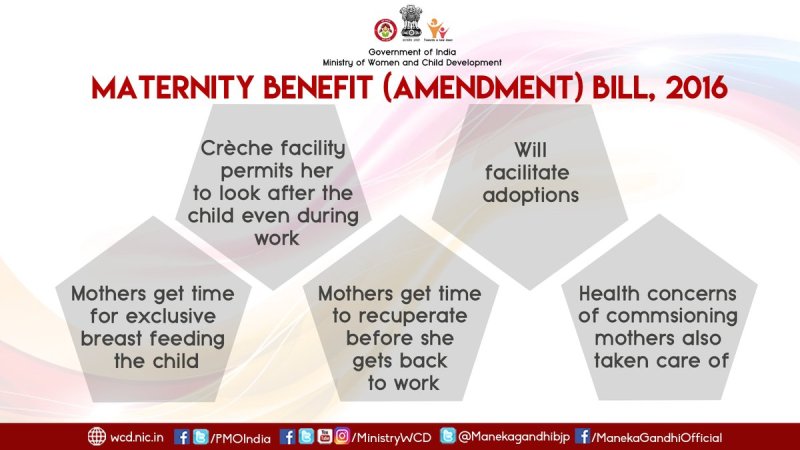In what can be a termed as a significant move for Indian women, the allowed maternity leave in the country has been increased from 12 weeks to 26 weeks, as per a new amendment to a legislation. The Maternity Benefit Amendment Bill, 2016, which was approved by the Lok Sabha recently, makes many changes to the benefits accorded to mothers returning to work. In addition to the extension of maternity leave, the law now also makes it mandatory for companies with more than 50 employees to provide a crèche facility within a prescribed distance. Mothers will be allowed four visits daily to the day care centre.


According to the amendment, commissioning mothers, who have a child through surrogacy, and women who adopt a child below the age of three months will be allowed leave of 12 weeks. The period of maternity leave will be calculated from the date the child is handed over to the commissioning or adoptive mother.
We had earlier written about the Maternity Benefits Act (1961) and found it lacking on many counts, primary being the lack of adequate maternity leave. The advantages of an increased maternity leave are multifold, which extends beyond the careers and economic independence of women, to the health of the entire nation. The most obvious benefits of this are increased compliance to the recommended six-month of breastfeeding, lower post-birthing depression in new mothers, and higher vaccination uptake – all ensuring better infant health.
A recent study by Hajizadeh et al (2016) in India’s peer countries such as Bangladesh, Cambodia, Kenya (in the low-and-medium-income group) proved a direct correlation of paid maternity or gender-neutral parental leave with infant mortality rate. An additional month of paid leave was associated with 10.3 fewer infant deaths per 1,000 live births. If implemented well, the same study claims the benefit could realise a reduction of up to 13 per cent in infant mortality. There also exists a strong association of the duration of maternity leave with “baby blues” or post-natal depression of new mothers. It is one of those multiple health problems faced by women soon after giving birth, the world over. The recorded prevalence of new mothers plummeting into clinical depression ranges between 11-15 per cent in high-income nations such as the US and UK, and goes as high as 40 per cent in low-and-middle income countries such as Pakistan.


The Ministry of Women and Child Development said, adding that the Bill will “pave the way for a healthy and secure mother and a well-nourished child”. Minister of Women and Child Development Smt. Maneka Gandhi called it a “momentous step”.
While the Bill is not without flaws (excludes mothers who work in organizations with less than 50 people; excessive burden on corporations which may cause organizations to not hire women in the child bearing phase; no element of government funding), we do appreciate that it takes a single step to cover the journey of many miles. Thus, while this is a positive move forward by the Government, we hope that this is implemented well.





